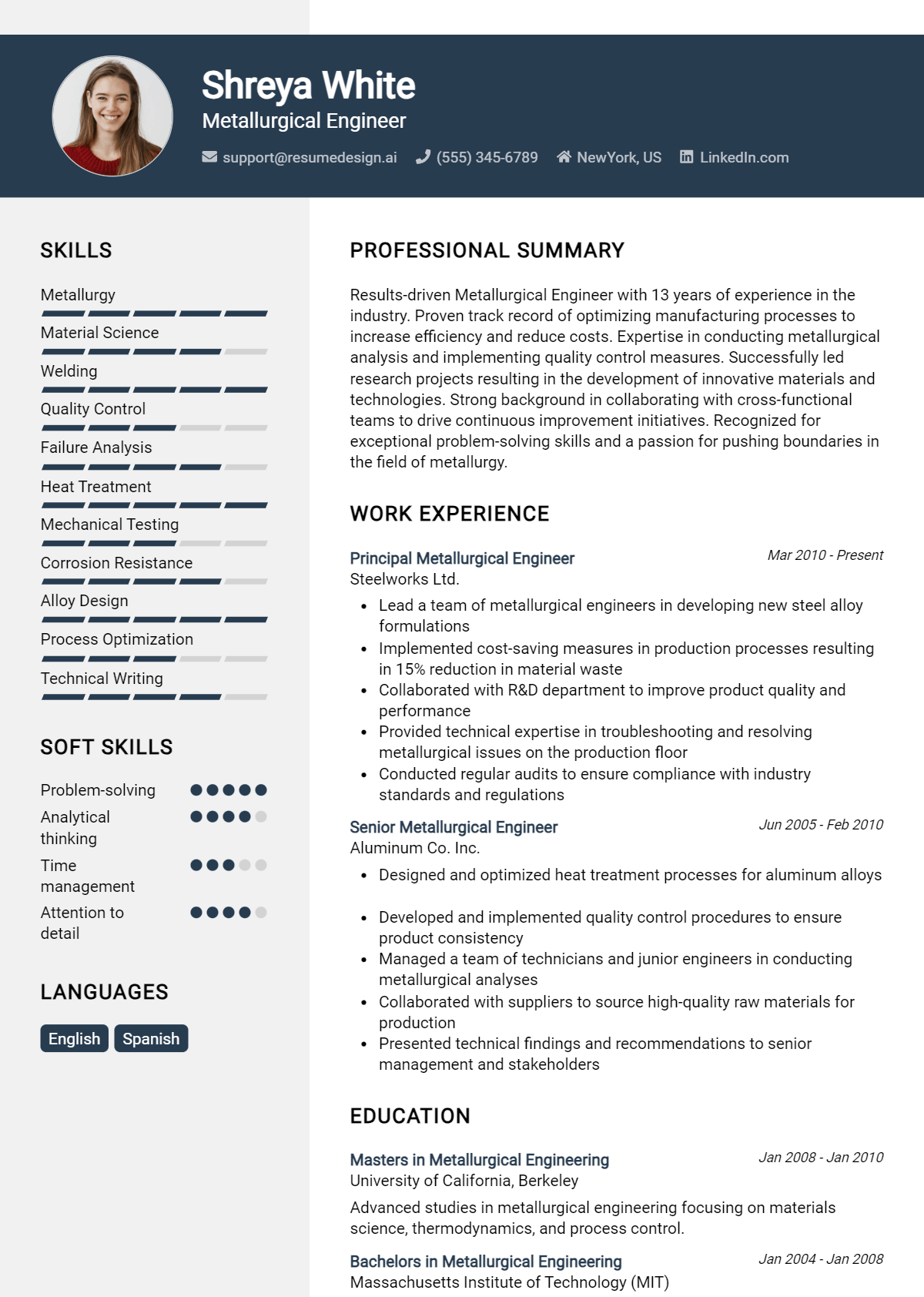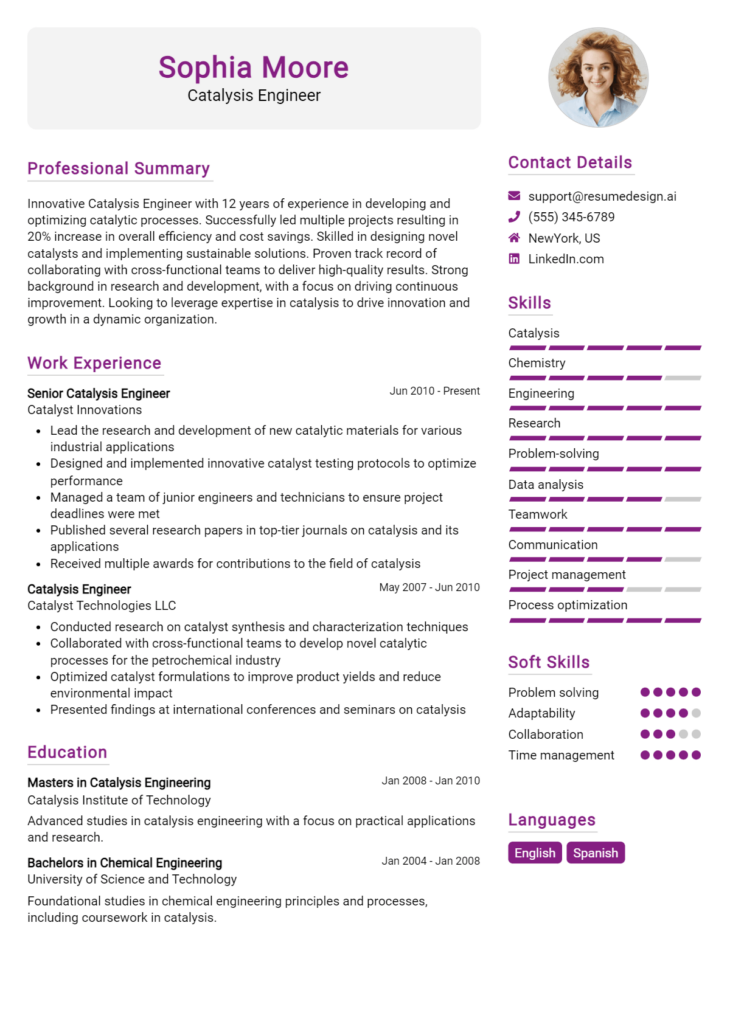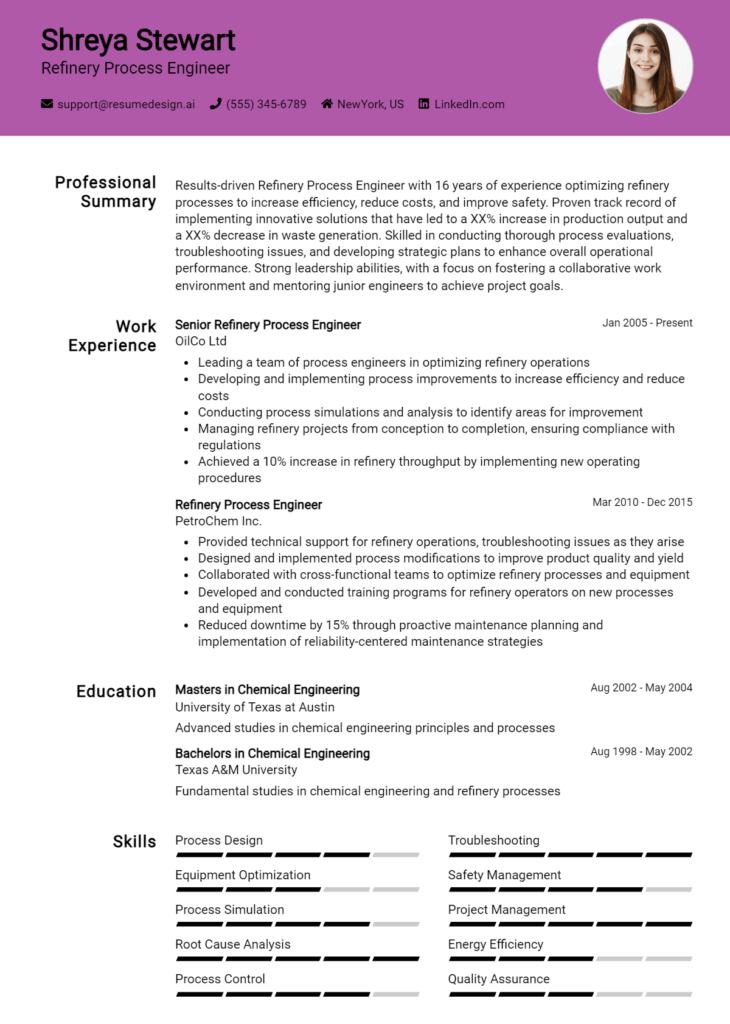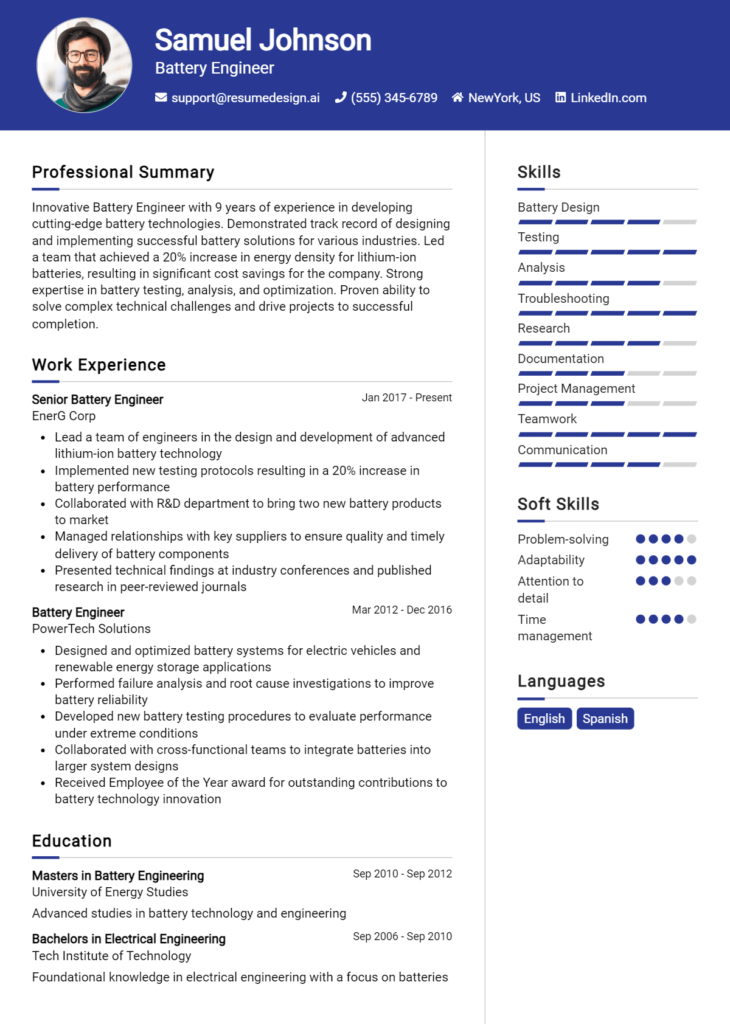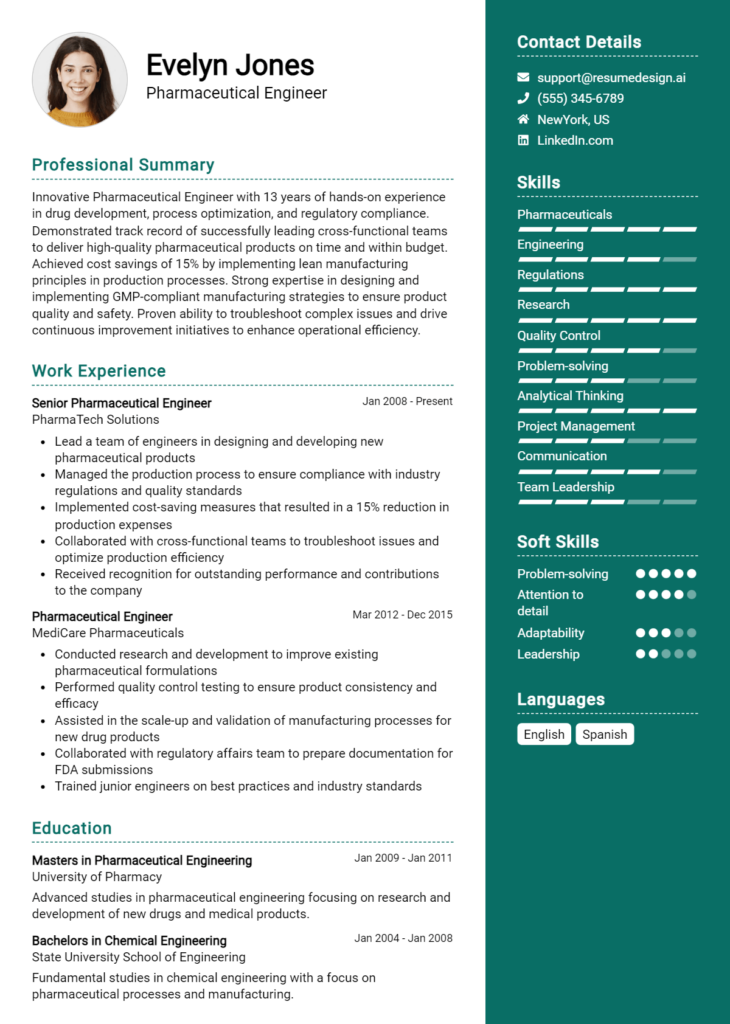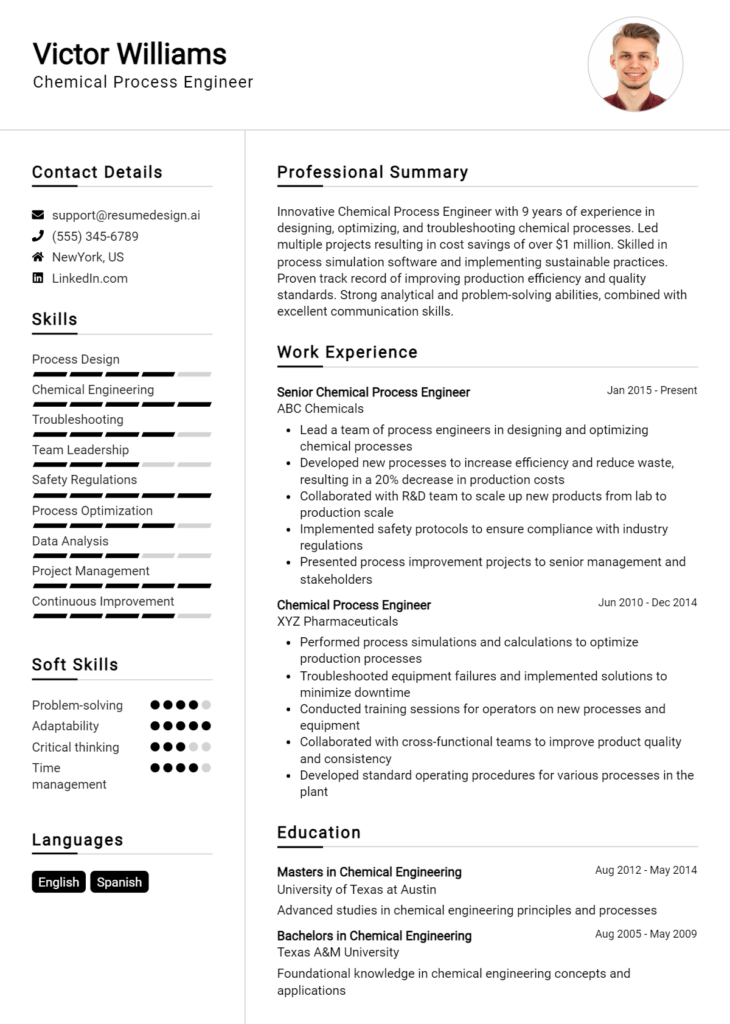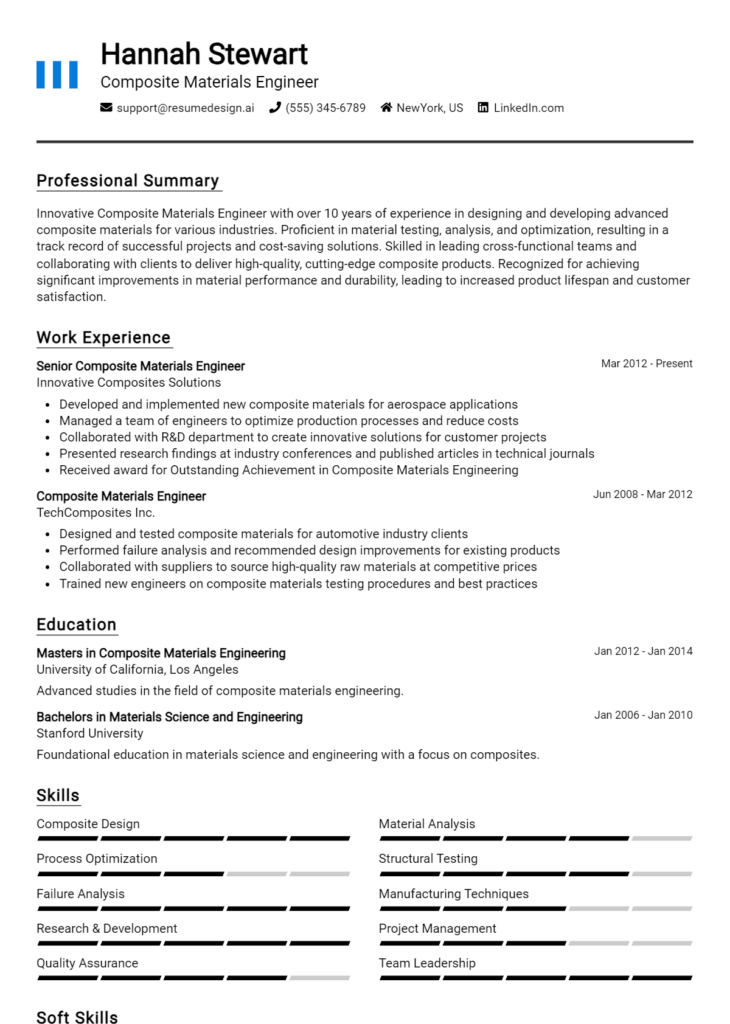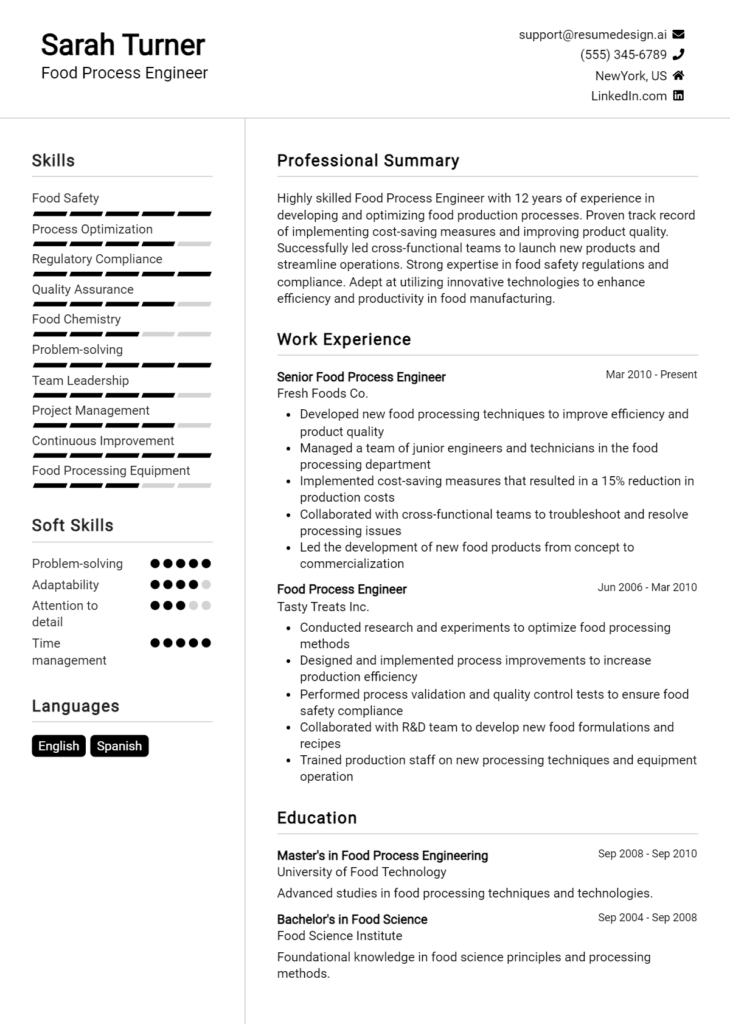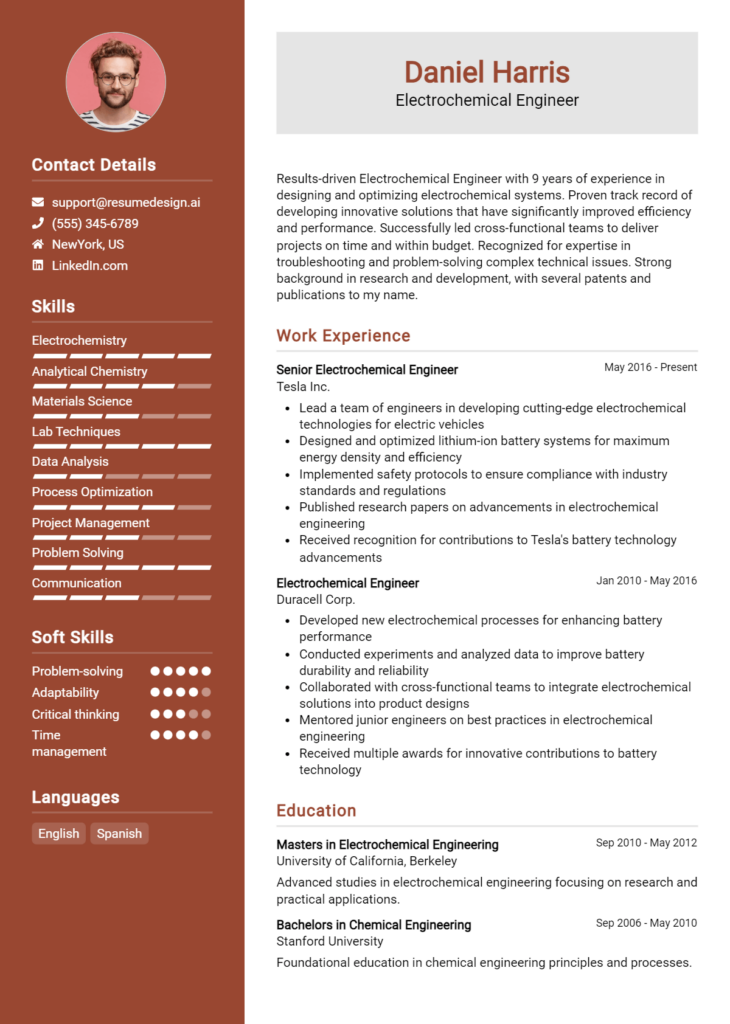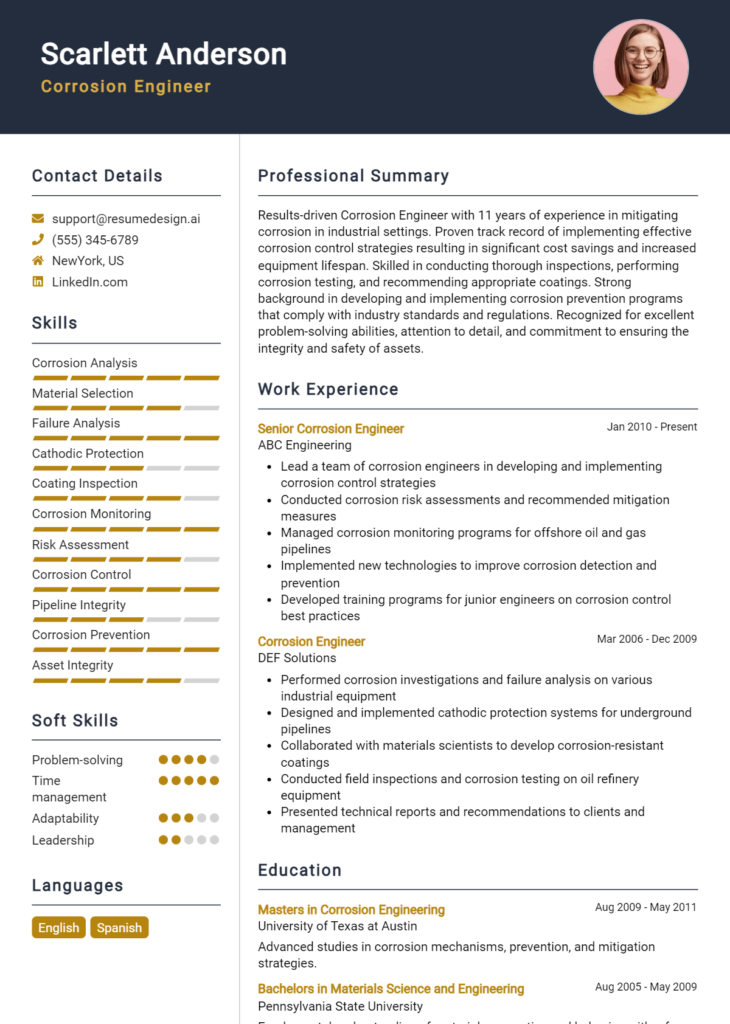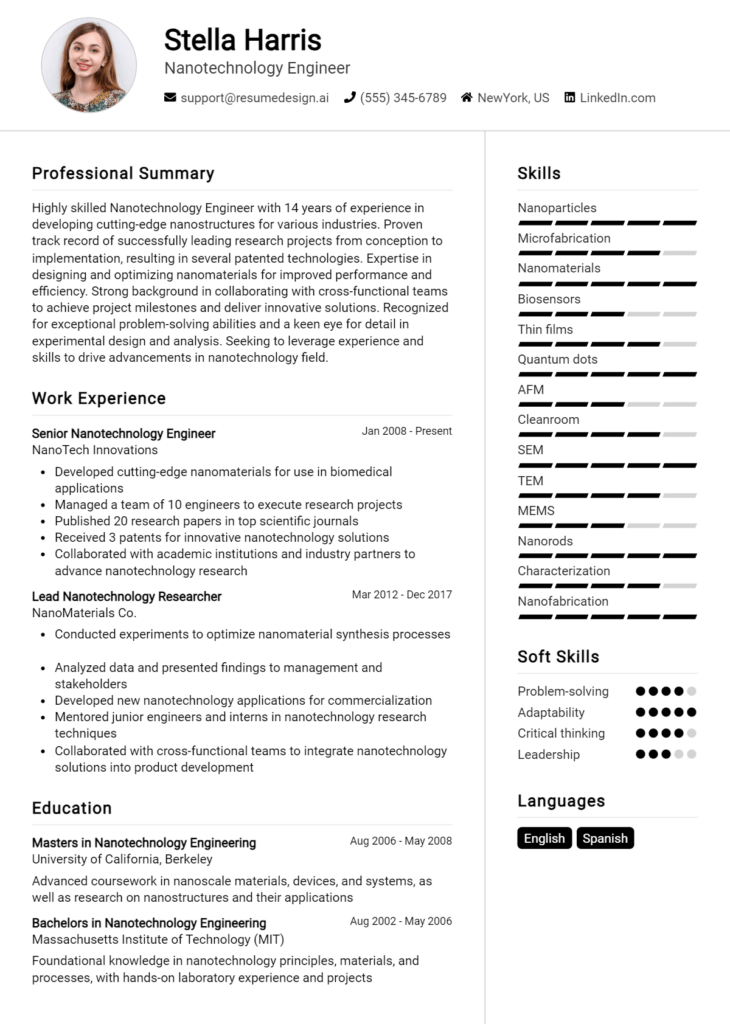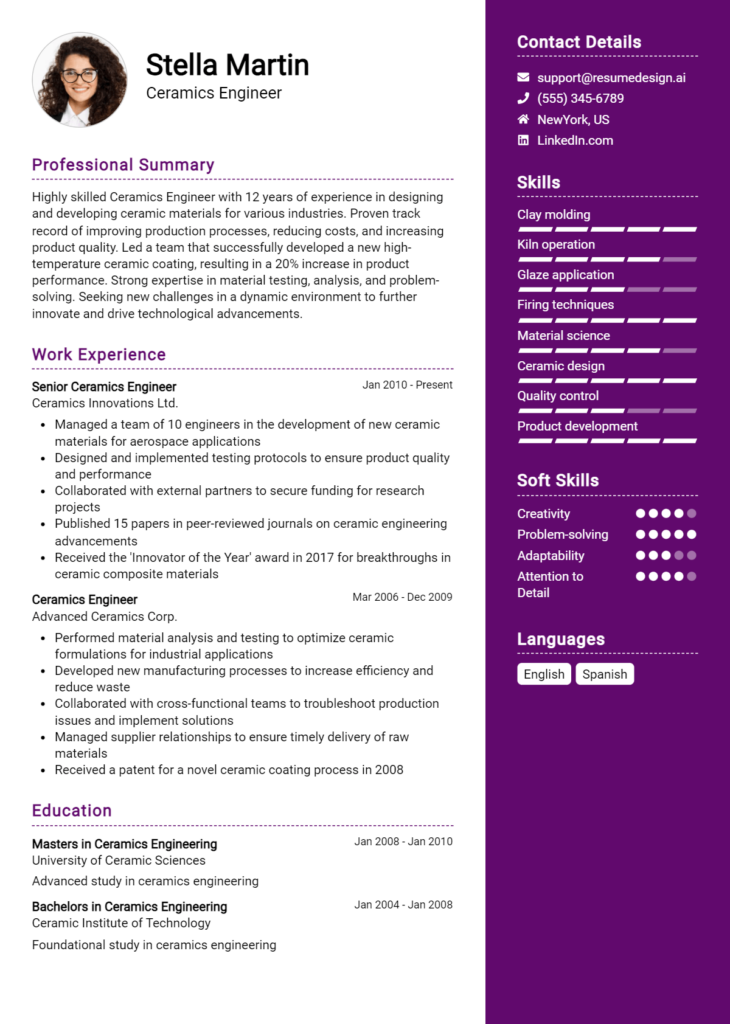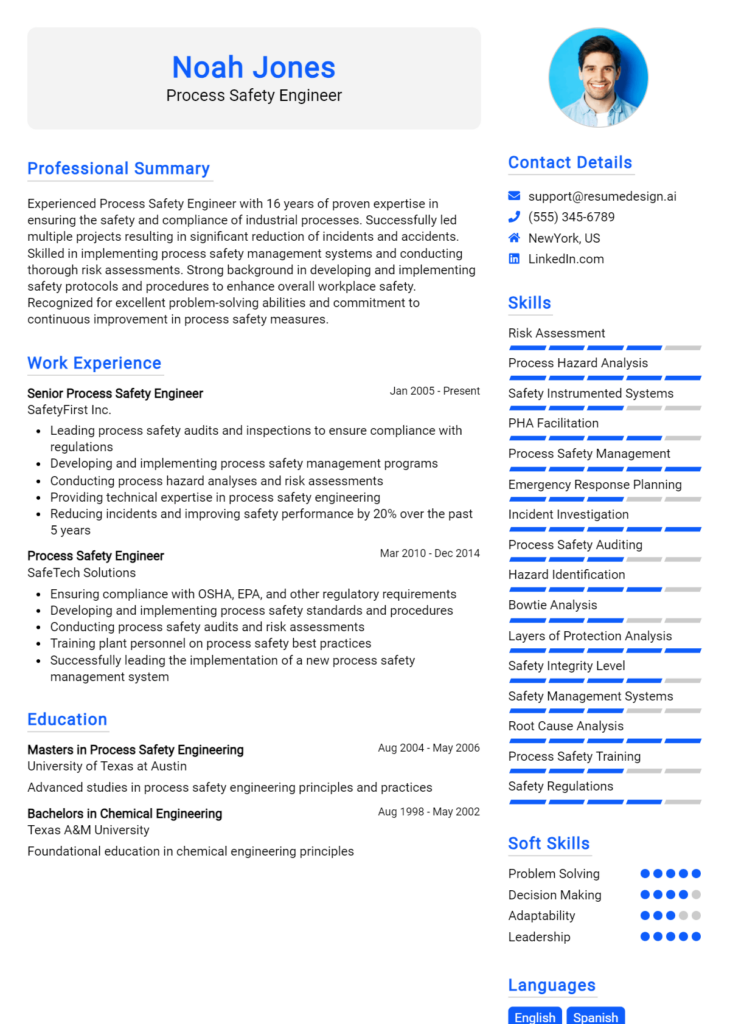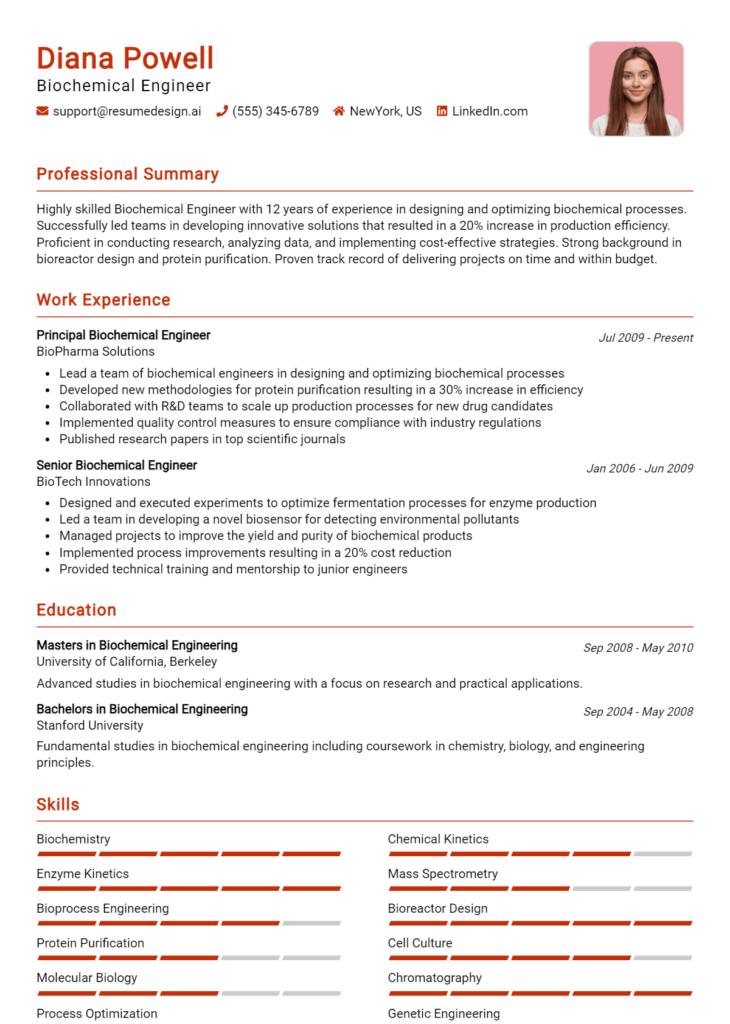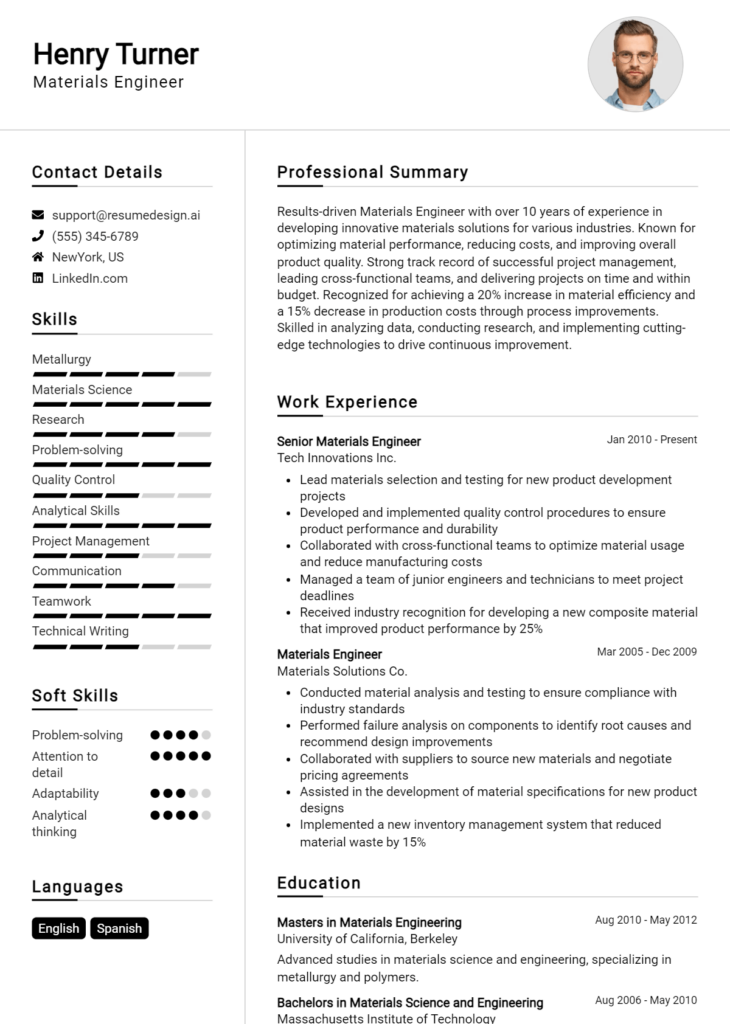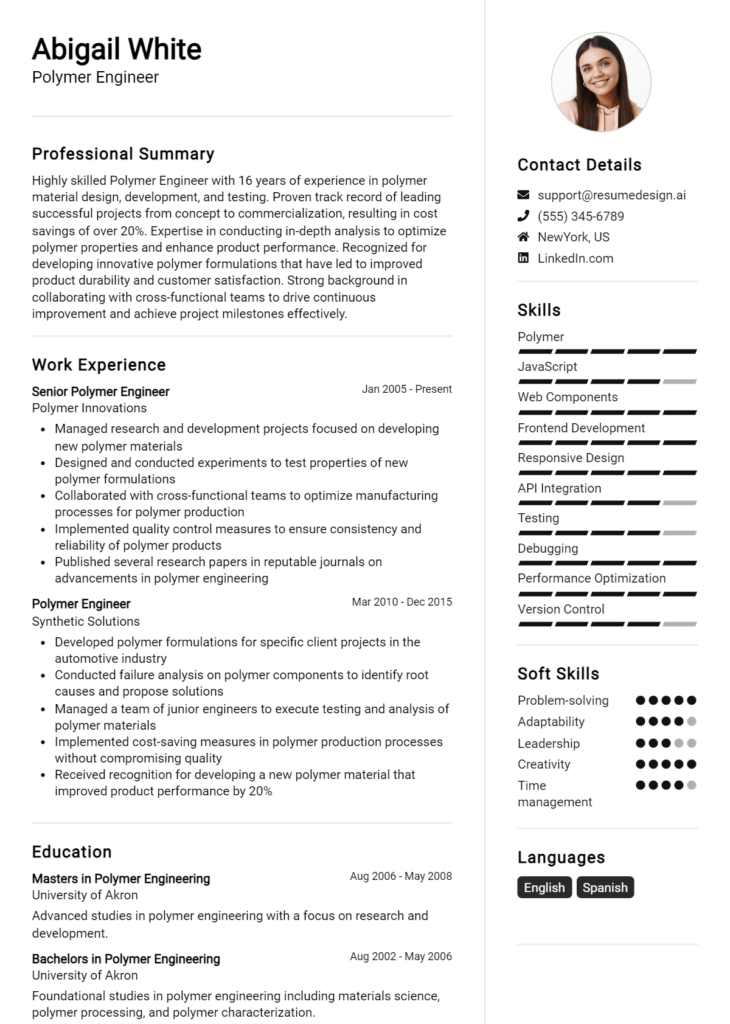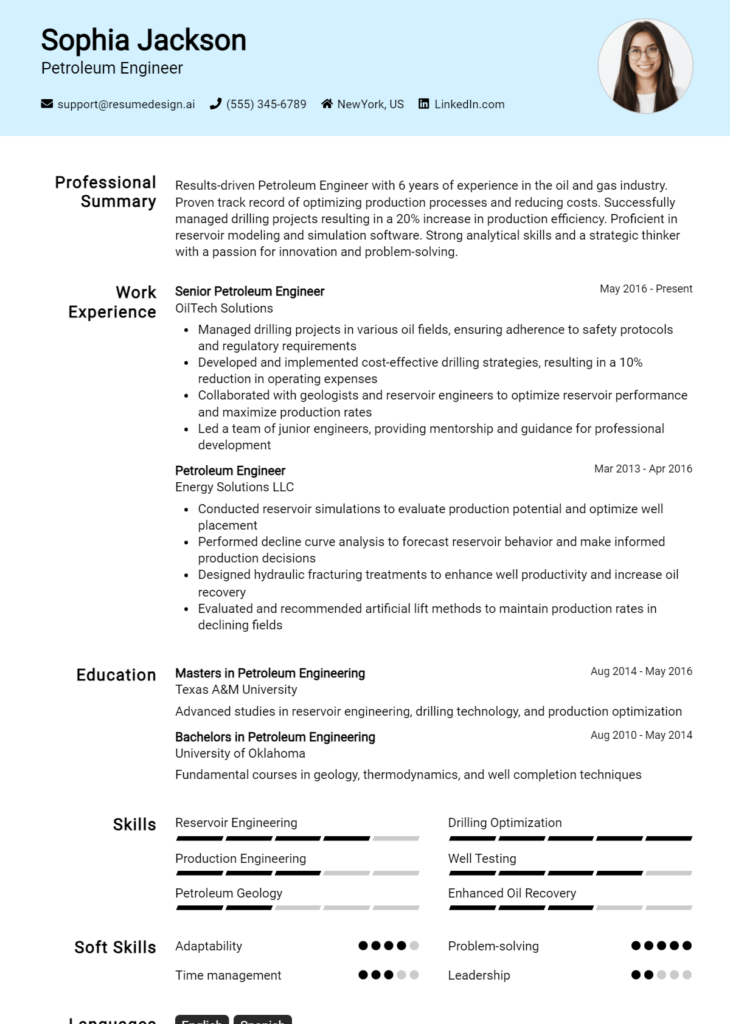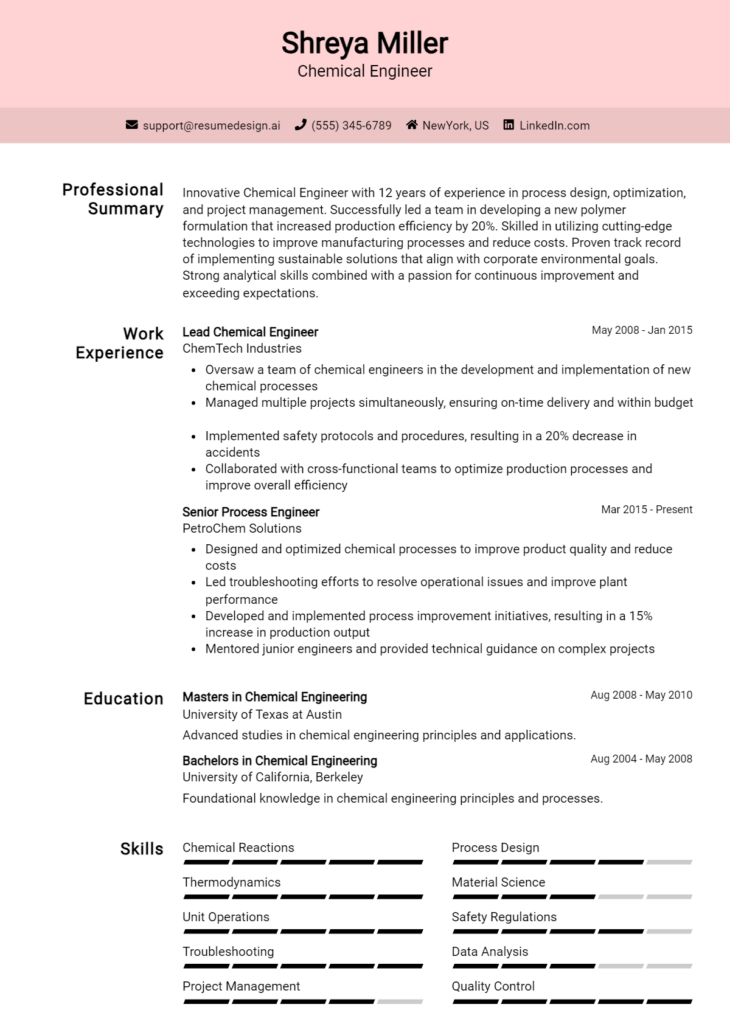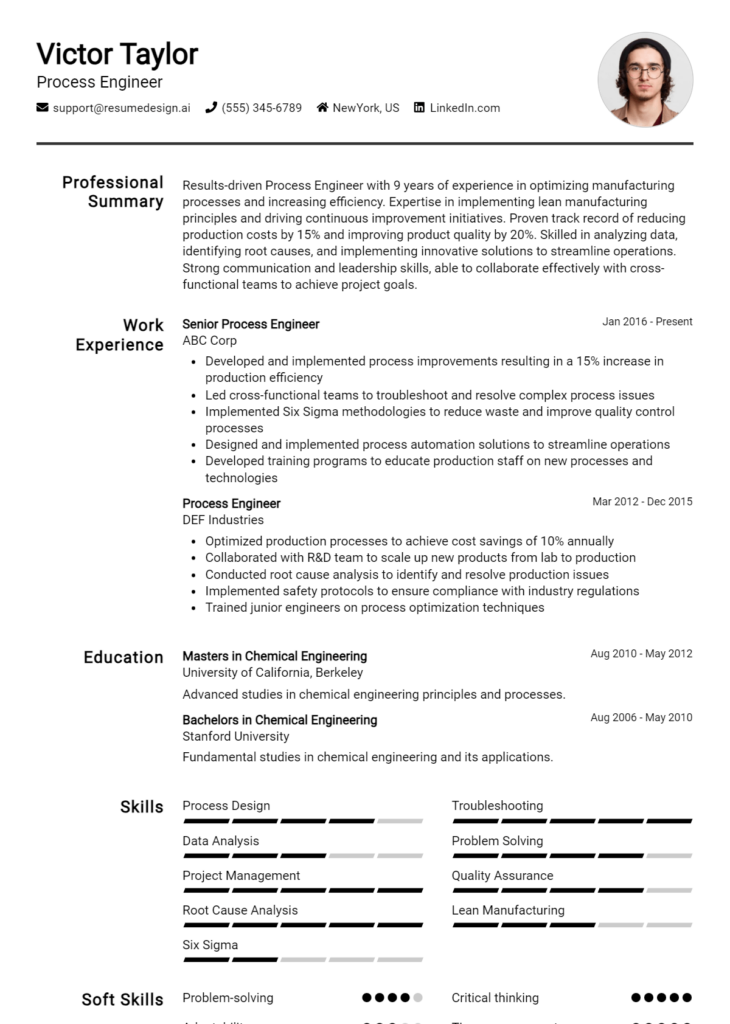Metallurgical Engineer Core Responsibilities
A Metallurgical Engineer is pivotal in enhancing material performance through their expertise in metals and alloys. Key responsibilities include analyzing material properties, optimizing manufacturing processes, and collaborating with design and production teams. Essential skills encompass technical acumen, operational efficiency, and strong problem-solving abilities, enabling the engineer to address challenges effectively. These competencies contribute significantly to achieving organizational goals. A well-structured resume highlighting these qualifications can attract potential employers by showcasing the engineer's multifaceted skill set.
Common Responsibilities Listed on Metallurgical Engineer Resume
- Conducting material analysis and testing to determine properties and performance.
- Developing and improving metallurgical processes for production efficiency.
- Collaborating with cross-functional teams to design and test new materials.
- Implementing quality control measures to ensure product specifications are met.
- Investigating material failures and providing solutions to prevent recurrence.
- Researching and recommending new materials and technologies for projects.
- Preparing detailed reports and documentation on findings and recommendations.
- Adhering to safety regulations and best practices in material handling.
- Training and mentoring junior engineers and technical staff.
- Utilizing software tools for simulation and analysis of material behavior.
High-Level Resume Tips for Metallurgical Engineer Professionals
In the competitive field of metallurgy, a well-crafted resume is crucial for Metallurgical Engineer professionals seeking to make their mark. Your resume often serves as the first impression you make on potential employers, acting as a window into your skills, achievements, and professional journey. A compelling resume not only showcases your technical expertise but also reflects your ability to solve complex problems and contribute to innovative projects. In this guide, we will provide practical and actionable resume tips specifically tailored for Metallurgical Engineer professionals, ensuring that your resume effectively communicates your qualifications and sets you apart from the competition.
Top Resume Tips for Metallurgical Engineer Professionals
- Tailor your resume to each job application by closely analyzing the job description and incorporating relevant keywords.
- Highlight your relevant experience by emphasizing projects or roles that align with the job you are applying for.
- Quantify your achievements by using numbers, percentages, and specific outcomes to demonstrate your impact in previous roles.
- Showcase industry-specific skills such as materials characterization, failure analysis, and metallurgical testing techniques.
- Include professional certifications and memberships in relevant organizations to enhance your credibility.
- Utilize a clean and professional format, ensuring easy readability and a logical flow of information.
- Incorporate keywords from the job posting to pass through Applicant Tracking Systems (ATS) effectively.
- Include a brief summary or objective statement that clearly outlines your career goals and what you bring to the table.
- Don’t forget to list software and tools you are proficient in, such as CAD software, simulation tools, or data analysis programs.
- Proofread your resume multiple times to eliminate any spelling or grammatical errors, as attention to detail is crucial in engineering.
By implementing these tips, Metallurgical Engineer professionals can significantly enhance their resumes, increasing their chances of landing an interview and ultimately securing a position in the field. A polished resume that effectively showcases your qualifications and achievements can make all the difference in a competitive job market.
Why Resume Headlines & Titles are Important for Metallurgical Engineer
In the competitive field of metallurgical engineering, a well-crafted resume headline or title serves as a crucial first impression that can set a candidate apart from the rest. A strong headline captures the attention of hiring managers by summarizing a candidate's key qualifications and expertise in a concise and impactful way. This brief yet powerful phrase should be directly related to the job being applied for, ensuring it aligns with the specific requirements of the position. By doing so, candidates can effectively communicate their value proposition at a glance, making it essential to invest time in creating a headline that resonates with potential employers.
Best Practices for Crafting Resume Headlines for Metallurgical Engineer
- Keep it concise – Aim for a headline that is no longer than a single sentence.
- Be role-specific – Tailor the headline to reflect the specific job title and responsibilities.
- Highlight key skills – Incorporate vital skills or certifications relevant to metallurgical engineering.
- Use strong action verbs – Start with impactful words that convey your expertise and achievements.
- Include years of experience – If relevant, mention your level of experience to add credibility.
- Make it unique – Differentiate yourself by including specific achievements or areas of specialization.
- Align with job description – Ensure your headline reflects the language and priorities found in the job posting.
- Avoid jargon – Use clear and straightforward language that is easy to understand.
Example Resume Headlines for Metallurgical Engineer
Strong Resume Headlines
Results-Driven Metallurgical Engineer with 10+ Years in Alloy Development and Quality Control
Dynamic Metallurgical Engineer Specializing in Corrosion Resistance and Material Optimization
Experienced Metallurgical Engineer with Proven Track Record in Process Improvement and Cost Reduction
Innovative Metallurgical Engineer with Expertise in Advanced Welding Techniques and Materials Science
Weak Resume Headlines
Engineer looking for a job
Metallurgical Engineer with experience
Skilled professional seeking opportunities
The strong headlines are effective because they clearly communicate the candidate's strengths, relevant experience, and specific skills, making them immediately appealing to hiring managers. They are tailored to the role and provide a snapshot of what the candidate brings to the table. In contrast, the weak headlines fail to impress due to their vagueness and lack of specificity, which do not convey any unique qualifications or compelling reasons for a hiring manager to take a closer look. A strong headline serves as a powerful marketing tool, while weak headlines can render a resume forgettable.
Writing an Exceptional Metallurgical Engineer Resume Summary
A well-crafted resume summary is crucial for a Metallurgical Engineer, as it serves as the first impression that captures the attention of hiring managers. A strong summary succinctly presents key skills, relevant experience, and notable accomplishments that align with the specific demands of the job. By effectively summarizing one’s professional qualifications, candidates can quickly demonstrate their value and suitability for the role, making it easier for hiring managers to assess their fit for the position. A concise and impactful summary tailored to the job description enhances the likelihood of moving forward in the hiring process.
Best Practices for Writing a Metallurgical Engineer Resume Summary
- Quantify achievements: Use numbers and metrics to illustrate your accomplishments.
- Focus on relevant skills: Highlight specific skills that are directly applicable to the job.
- Tailor the summary: Customize the summary to reflect the requirements and keywords of the job description.
- Keep it concise: Aim for 2-4 sentences that effectively communicate your qualifications.
- Include industry-specific language: Use terminology that resonates within the metallurgical engineering field.
- Showcase problem-solving abilities: Emphasize your capability to address challenges and deliver results.
- Highlight certifications and education: Mention relevant credentials that enhance your qualifications.
- Demonstrate teamwork and leadership: Include experiences that showcase your ability to work in teams or lead projects.
Example Metallurgical Engineer Resume Summaries
Strong Resume Summaries
Results-driven Metallurgical Engineer with over 7 years of experience in developing innovative metal alloys that improved product durability by 30%. Proven expertise in metallurgical testing and analysis, contributing to a 15% reduction in production costs through process optimization.
Detail-oriented Metallurgical Engineer with a Master’s degree in Materials Science, specializing in failure analysis and preventative strategies. Successfully led a cross-functional team that reduced scrap rates by 20%, enhancing overall production efficiency.
Metallurgical Engineer with extensive experience in metallurgical process design and quality control, achieving a 25% increase in yield through the implementation of advanced manufacturing techniques. Strong background in project management and compliance with industry standards.
Weak Resume Summaries
Metallurgical Engineer with experience in various projects and a strong interest in metals and materials.
Dedicated engineer looking for a position in metallurgy. Skilled in engineering and team collaboration.
The strong resume summaries are considered effective because they provide specific, quantifiable achievements and directly relate to the responsibilities of a Metallurgical Engineer. They highlight critical skills and demonstrate the candidate's impact on their previous roles. In contrast, the weak summaries lack specificity and measurable outcomes, making them appear generic and less compelling, which can fail to engage hiring managers.
Work Experience Section for Metallurgical Engineer Resume
The work experience section of a Metallurgical Engineer's resume is crucial for demonstrating a candidate's technical skills, leadership capabilities, and commitment to delivering high-quality products. This section not only highlights the engineer's hands-on experience with materials and processes but also showcases their ability to manage teams effectively and drive projects to successful completion. By quantifying achievements and aligning experiences with industry standards, candidates can present a compelling narrative that emphasizes their value to potential employers.
Best Practices for Metallurgical Engineer Work Experience
- Use specific technical terminology relevant to metallurgical engineering to showcase expertise.
- Quantify achievements with metrics, such as percentage improvements or cost savings.
- Highlight leadership roles or team management experiences to demonstrate collaboration skills.
- Focus on results-oriented statements that illustrate the impact of your contributions.
- Align your experience with industry standards and best practices to enhance credibility.
- Include any certifications or specialized training that reinforce your qualifications.
- Tailor your experiences to match the job description, emphasizing relevant projects and skills.
- Use action verbs to create a dynamic narrative of your professional journey.
Example Work Experiences for Metallurgical Engineer
Strong Experiences
- Led a team of 5 engineers in developing a new alloy formulation that improved tensile strength by 15%, reducing production costs by 10%.
- Implemented advanced metallurgical testing procedures that decreased material failure rates by 20%, enhancing product reliability.
- Collaborated with cross-functional teams to design and launch a sustainable recycling process for scrap metal, increasing material recovery by 30%.
- Managed the quality assurance program for a new product line, resulting in a 40% reduction in customer complaints within the first year of production.
Weak Experiences
- Worked on various projects related to materials.
- Assisted in the development of new products.
- Participated in team meetings and discussions.
- Responsible for ensuring quality in production processes.
The examples provided illustrate the difference between strong and weak experiences in a Metallurgical Engineer's resume. Strong experiences are characterized by specific, quantifiable outcomes that demonstrate technical leadership and collaboration, making them impactful and memorable. In contrast, weak experiences lack detail, specificity, and measurable results, which fail to effectively convey the candidate's value or contributions to previous roles.
Education and Certifications Section for Metallurgical Engineer Resume
The education and certifications section of a Metallurgical Engineer resume plays a crucial role in showcasing the candidate's foundational knowledge and specialized skills in the field. This section not only highlights the academic background of the candidate but also emphasizes any industry-relevant certifications and ongoing learning efforts. By providing details about relevant coursework, certifications, and specialized training, candidates can significantly enhance their credibility and demonstrate their alignment with the specific requirements of the job role, making them more attractive to potential employers.
Best Practices for Metallurgical Engineer Education and Certifications
- Include relevant degrees such as a Bachelor's or Master's in Metallurgical Engineering or Materials Science.
- List industry-recognized certifications, such as Certified Metallurgical Engineer (CME) or Six Sigma certifications.
- Highlight any specialized training programs or workshops related to metallurgical processes or materials testing.
- Provide detailed descriptions of coursework that align with the job requirements, such as materials characterization or thermodynamics.
- Emphasize continuous learning by including recent courses or certifications obtained, especially in emerging technologies.
- Use clear and concise formatting to enhance readability, ensuring that the most relevant qualifications stand out.
Example Education and Certifications for Metallurgical Engineer
Strong Examples
- Bachelor of Science in Metallurgical Engineering, University of XYZ, Graduated May 2020
- Certified Metallurgical Engineer (CME), National Institute of Metallurgy, 2021
- Completed coursework in Materials Characterization, Thermodynamics, and Corrosion Engineering
- Six Sigma Green Belt Certification, Quality Institute, 2022
Weak Examples
- Bachelor of Arts in English Literature, University of ABC, Graduated 2015
- Outdated certification in Welding Technology, obtained in 2010
- Completed unrelated coursework in Business Management and Marketing
- Certification in a now-defunct program, Basic Metallurgy, from 2008
The strong examples are considered effective because they directly relate to the field of metallurgical engineering, showcasing relevant education and certifications that are recognized in the industry. In contrast, the weak examples reflect qualifications that do not align with the requirements of the role, either due to irrelevance or obsolescence, which could detract from the candidate's suitability for a position in metallurgical engineering.
Top Skills & Keywords for Metallurgical Engineer Resume
The role of a Metallurgical Engineer is critical in numerous industries, including aerospace, automotive, and manufacturing, where the properties and behaviors of materials can significantly impact product performance and safety. A well-crafted resume that highlights the right skills can set a candidate apart in a competitive job market. Employers are not only looking for technical expertise but also for soft skills that demonstrate the candidate's ability to collaborate effectively, solve problems creatively, and adapt to changing environments. Therefore, emphasizing a blend of both hard and soft skills in a Metallurgical Engineer resume is essential for showcasing a well-rounded professional profile.
Top Hard & Soft Skills for Metallurgical Engineer
Soft Skills
- Problem-solving
- Critical thinking
- Communication
- Teamwork
- Adaptability
- Attention to detail
- Project management
- Time management
- Creativity
- Leadership
Hard Skills
- Materials science
- Metallurgy principles
- Failure analysis
- Welding technology
- Quality control processes
- Heat treatment techniques
- Non-destructive testing (NDT)
- Metallographic analysis
- CAD software proficiency
- Statistical process control (SPC)
Incorporating these skills into your resume, alongside relevant work experience, will help you present a compelling case to potential employers in the field of metallurgical engineering.
Stand Out with a Winning Metallurgical Engineer Cover Letter
Dear [Hiring Manager's Name],
I am writing to express my interest in the Metallurgical Engineer position at [Company Name], as advertised on [where you found the job listing]. With a Bachelor’s degree in Metallurgical Engineering from [Your University] and over [X years] of hands-on experience in materials development and failure analysis, I am confident in my ability to contribute effectively to your team. My background includes extensive research in alloy development and a strong commitment to optimizing processes to enhance product quality and performance.
In my previous role at [Previous Company Name], I successfully led a project focused on the development of high-performance alloys for aerospace applications. This involved close collaboration with cross-functional teams to ensure that the materials met strict industry standards while also being cost-effective. My proficiency in various metallurgical techniques, including metallography, heat treatment, and corrosion testing, allowed me to deliver innovative solutions that not only improved product durability but also reduced production costs by [X%]. I am excited about the possibility of bringing this expertise to [Company Name] and supporting your mission of delivering exceptional engineering solutions.
Moreover, my strong analytical skills and attention to detail have equipped me to troubleshoot complex material issues effectively. I have a proven track record of using data-driven approaches to identify root causes of failures and implement corrective actions. I am also passionate about staying current with the latest advancements in materials science, which I believe is essential for driving innovation in the field. I am eager to apply this knowledge to help [Company Name] maintain its reputation for cutting-edge engineering and exceptional quality.
Thank you for considering my application. I look forward to the opportunity to discuss how my skills and experiences align with the goals of your team. I am excited about the chance to contribute to [Company Name] and help advance your projects in metallurgical engineering.
Sincerely,
[Your Name]
[Your Phone Number]
[Your Email Address]
[LinkedIn Profile or Professional Website, if applicable]
Common Mistakes to Avoid in a Metallurgical Engineer Resume
When crafting a resume as a Metallurgical Engineer, it's essential to present your qualifications and experience in a clear and compelling manner. However, many candidates make common mistakes that can hinder their chances of securing an interview. By avoiding these pitfalls, you can create a resume that effectively showcases your skills and aligns with the expectations of potential employers in the metallurgy field.
Lack of Specificity: Generalizing your experience can dilute your impact. Instead of saying "worked on various projects," specify the types of projects and techniques you used, such as "developed heat treatment processes for steel alloys."
Ignoring Keywords: Many employers use applicant tracking systems (ATS) to filter resumes. Failing to include relevant industry keywords from the job description can result in your resume being overlooked.
Poor Formatting: A cluttered or unorganized resume can be off-putting. Use clear headings, bullet points, and consistent formatting to enhance readability and professionalism.
Overloading with Technical Jargon: While technical expertise is crucial, using too much jargon can alienate non-technical reviewers. Strike a balance by explaining complex terms in simpler language when possible.
Neglecting Soft Skills: Metallurgical engineering often requires collaboration and communication. Focusing solely on technical skills without mentioning soft skills, like teamwork and problem-solving, can paint an incomplete picture.
Omitting Relevant Certifications: Certifications such as Six Sigma or specific metallurgy-related credentials can set you apart. Ensure that these qualifications are prominently listed on your resume.
Failing to Quantify Achievements: Providing quantifiable results, such as percentage improvements in process efficiency or cost savings, can significantly enhance your resume. Use numbers to illustrate your impact on previous roles.
Typos and Grammatical Errors: Even minor mistakes can make a bad impression. Always proofread your resume to ensure it's free of errors, as they can suggest a lack of attention to detail.
Conclusion
As a Metallurgical Engineer, your expertise in materials science, metallurgy, and engineering principles is crucial in industries ranging from aerospace to automotive manufacturing. Throughout this article, we've discussed the importance of showcasing your technical skills, relevant experience, and educational background effectively in your resume.
It's essential to highlight your proficiency in materials testing, failure analysis, and your ability to work with various metals and alloys. Additionally, emphasizing your problem-solving skills and project management experience can set you apart from other candidates in this competitive field. Tailoring your resume to align with the specific job requirements will further enhance your chances of landing your desired position.
Now is the perfect time to revisit and refine your Metallurgical Engineer resume. Make sure it reflects your skills and experiences accurately and effectively. To assist you in this process, consider utilizing resources like resume templates, a comprehensive resume builder, and resume examples tailored for engineering professionals. Additionally, don't overlook the importance of a strong first impression with a compelling cover letter template.
Take action today to enhance your resume and increase your chances of success in the job market. Your next career opportunity as a Metallurgical Engineer could be just a well-crafted resume away!

